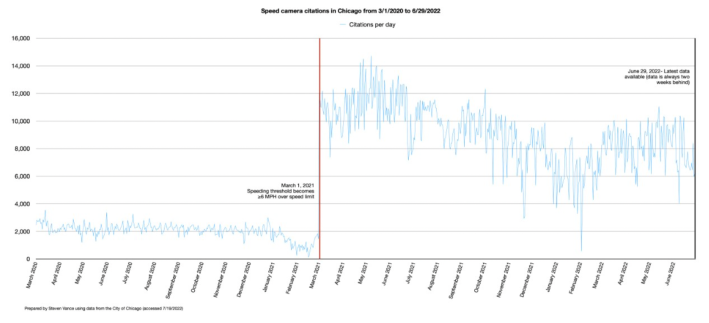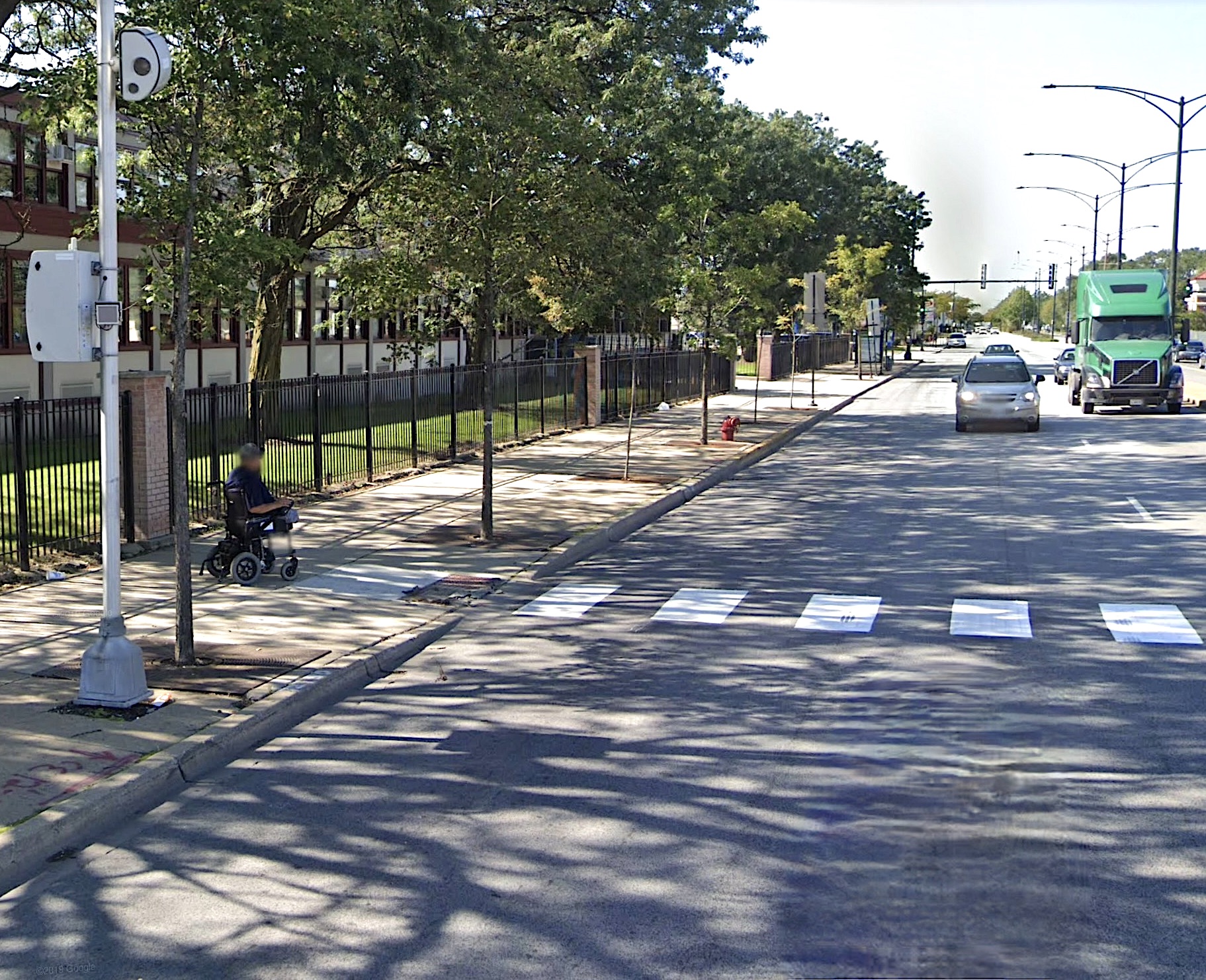Email your alder to ask them to vote against allowing 9 mph speeding near parks and schools.
At Wednesday's 10 a.m. Chicago City Council meeting, alderpersons will likely take a final vote on Ald. Anthony Beale's proposed ordinance that would essentially legalize speeding by 9 mph in speed camera zones near schools and parks. Streetsblog Chicago has covered this topic in depth, but here's the issue in a nutshell:
- Chicago's speed cameras have been proven effective at reducing injury and fatality crashes. A January 2022 University of Illinois study found that from 2015-17 the cameras reduced severe and fatal injury crashes by 15 percent, and prevented a total of 204 injury/fatality crashes.
- Black Chicagoans are killed in traffic crashes at more than twice the rate of white residents.
- The UIC study found that the cameras aren't concentrated in Black or Latino communities.
- However, the UIC study found there were major racial and economic disparities in who was being recorded speeding, and how the fines and fees impacted people of different income levels.
- In response to these findings, in April 2022 the city launched the Clear Path ticket equity program, which halves the fines for residents making less than $41K (more for people in larger households) and offers a ticket debt forgiveness program, which goes a long way to address equity concerns. That means residents meeting the income requirement only need to pay $17.50 for 6-10 mph speeding tickets, less than a few gallons of gas.
- Chicago's 6 mph ticketing threshold, launched in March 2021, has been very effective in reducing speeding by 6-9 mph. After an initial spike when the rule kicked in, the number of tickets issued has fallen steadily (aside from seasonal variations – people drive less in winter and school speed cameras don't operate during breaks) as many drivers learned not to speed by more than 5 mph in speed camera zones near schools and parks.

- We know the 6 mph rule has increased safety, because federal studies found people struck at 30 mph (Chicago's default speed limit) usually survive, which those struck at 39 mph (which would be allowed in 30 zones under Beale's ordinance) almost always die.
- Therefore, if the ordinance to raise the speed camera ticketing threshold to 10 mph passes, more Chicagoans will be seriously injured and killed in crashes.
- Voting to allow deadly speeds in school and park zones would be particularly unconscionable after speeding/negligent drivers killed four Chicago children last month: Rafi Cardenas, 2; Lily Shambrook, 3; Ja’Lon James, 11; and Joshua Avina-Luna, 15.
The Active Transportation Alliance launched a letter-writing campaign against raising the speed camera threshold. Fellow Chicago-based sustainable transportation advocacy organizations Bike Lane Uprising and Better Streets Chicago have been doing some great advocacy work on this issue as well. Let's take a look at some of BLU and BSC's recent talking points.
Bike Lane Uprising
BLU, which documents bikeway obstructions in Chicago and many other cities, and helps organize demonstrations at fatal bike crash sites and ghost bike memorial installations, recently posted a helpful update and map of where Chicago's 50 alderpersons currently stand on the speed camera issue.
"An all-time record high of cyclists and pedestrians have been killed in Chicago the past few years," Bike Lane Uprising noted. "Raising the speed threshold will likely raise the death toll." They pointed out that Beale's ordinance needs 26 votes to pass the 50-member Council. (If it passes with fewer than 33 votes, Mayor Lori Lightfoot has indicated that she will veto the legislation.)
According to Bike Lane Uprising, according to the last month's City Council Committee on Finance vote and public statements, 18 alderpersons have indicated that they will vote on Wednesday to allow 9 mph speeding, while another 23 are likely opposed. That leaves these nine remaining undecided alders.
- Stephanie Coleman (16th) (Coleman has indicated she supports allowing 9 mph speeding, but BLU has her down as "unknown.")
- Jeanette Taylor (20th)
- Monique Scott (24th)
- Byron Sigcho-Lopez (25th)
- Roberto Maldonado (26th)
- Rossana Rodriguez (33rd)
- Carlos Ramirez-Rosa (35th)
- Gilbert Villegas (36th)
- Samantha Nugent (39th)
Serious question: What equity issues do you see with the status quote, in which people making <$41K only need to pay half the fine, and there’s a debt forgiveness program? Hopefully the “compromise” won’t involve tolerating higher, more deadly speeding.
— John Greenfield (@greenfieldjohn) July 19, 2022
Bike Lane Uprising notes that it's crucial for constituents of undecided alderpersons to let their reps know they don't want to allow 9 mph speeding. They encourage residents to email or call their alder (find yours here) to ask their position on the issue, and let BLU know by emailing hello[at]bikelaneuprising[dot]com. (Feel free to drop a line me a line at jgreenfield[at]streetsblogchicago[dot]org as well.)
Better Streets Chicago
Better Streets, a sustainable transportation advocacy organization (Streetsblog Chicago co-editor Courtney Cobbs is a cofounder) also has an insightful blog post about the speed camera issue. They've launched their own petition on the subject.
Better Streets points out much of the info stated at the top of the post. "It is disappointing that the City Council is considering this change as the City is experiencing a significant increase in traffic violence including the recent deaths of six residents walking or biking, including four Chicago youth ages 2 to 16 killed this summer."
While BSC doesn't want to see 9 mph speeding allowed, they go on to list a number of ways they think the speed camera program, and traffic safety in general, should be improved in Chicago, calling on alderpersons to make these things happen. Here are some of their ideas.
- Establish a lower citywide speed limit.
- Earmark all traffic camera revenue to traffic safety infrastructure and expanded transit service. (By state law, the revenue is currently reserved for various safety initiatives around schools and parks, also including policing near these facilities, the Safe Passage public school safety program, and after-school programs)<
- Install speed cameras near all schools, parks, "and other defined areas of concern; establishing clear metrics to determine the success or failure of a camera in improving desired safety outcomes; outlining improvements communities can pursue that would result in cameras being removed."
- Make speed camera zones more conspicuous by adding more speed feedback signs, which would be a win-win for safety and motorists' pocketbooks. The city is already planning to install 100 of these signs this year.
- Follow the UIC report's recommendations about evaluating camera locations to make sure they are optimizing safety, and relocate or decommission less effective cams.
"Speed cameras can and should play an important role in maintaining safe streets for all users, but this must be met with fundamental reforms and investments in redesigning our streets to prioritize people and safety first," Better Streets concludes.
Email your alder to ask them to vote against allowing 9 mph speeding near parks and schools.






